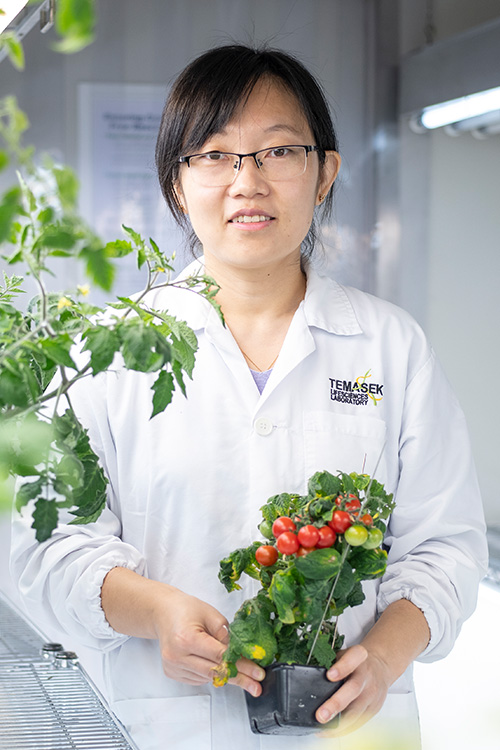
Impact
Food security is becoming a major global challenge because of growing populations, changing climates and increasing environmental degradation. Nevertheless, food security can be enhanced by increasing crop yield via a combination of technologies. These include plant genetic breeding techniques that heavily rely on gene function characterization, including those involved in RNA modifications, which have been shown to affect agriculturally important traits, specifically seed development, plant stature, flowering, and response to various stress conditions in recent years.
Collaborations, Achievements & Honours
- Published over 50 articles in international refereed journals, such as Nature, Nature Plants, Developmental Cell, Science Advances, Genome Biology, Advanced Science, Molecular Plant, Plant Cell, and Trends in Plant Science
- Significant contributions to the understanding of RNA modifications in plants in recent years
- Granted research by the Singapore Food Agency Singapore Food Story R&D (2021)
- Granted research by the National Research Foundation Competitive Research Programme (2020)
- Granted research by the A*STAR Industry Alignment Fund Pre-positioning Programme (2020)
- Collaborations with A*STAR, NUS, and NTU on improving leafy vegetable production and nutritional levels in urban farm settings
Research Areas
Developmental Biology, Genetics & Genomics, Crop Biotechnology
Affiliations
- Principal Investigator, TLL
- Adjunct Assistant Professor, Department of Biological Sciences, NUS
Question
What are the molecular mechanisms underlying RNA modifications in plant development and stress adaptation, and how can this knowledge be harnessed to develop novel crop varieties?
Approach
Lisha’s lab is at the forefront of uncovering the mechanisms underlying RNA modifications, e.g. m6A, in plant development, establishing a previously unexplored conceptual framework that governs both plant growth and environmental adaptation. By investigating how RNA modifications influence key biological processes such as gene expression regulation, mRNA stability, and protein translation, the lab is shedding light on how plants respond to developmental cues and environmental stresses. This groundbreaking research spans model plants and commercially important crops, providing critical insights into the molecular underpinnings of traits like flowering time, seed development, and stress resilience. Through a combination of cutting-edge molecular biology, genomics, and bioinformatics approaches, Lisha’s lab aims to bridge the gap between fundamental science and practical applications, redefining our understanding of plant biology and offering novel strategies for crop improvement.
Building on these discoveries, Lisha’s lab is exploring advanced breeding strategies to address the challenges of modern agriculture. By integrating germplasm collection, gene discovery, and genome editing tools such as CRISPR-Cas9, the lab is focused on creating innovative leafy vegetable varieties. These efforts target popular crops like lettuce and kale, tailoring their genetic profiles to develop traits optimized for urban farming systems. The improved varieties are designed to thrive in controlled environments, offering enhanced growth rates, higher yields, improved nutrient content, and resilience to environmental stressors. By aligning cutting-edge research with the needs of urban agriculture, Lisha’s lab is contributing to a sustainable future where novel crop varieties maximize productivity and quality in vertical farms and other controlled agricultural systems, addressing the growing demand for fresh, nutritious produce in densely populated urban areas.
Bio
Lisha earned her Bachelor degree from Shanghai Jiao Tong University and PhD from NUS. She joined TLL as a Junior Research Fellow in 2010, and is currently leading an independent research group as Principal Investigator. Lisha is also an Adjunct Assistant Professor in the Department of Biological Sciences at NUS.
Principal Investigator
Shen Lisha
The lab studies how plant molecular breeding maximises the productivity and quality of urban agriculture.
Group Publications
-
Epitranscriptomic regulation through phase separation in plants
Shen L. -
TMK4-mediated FIP37 phosphorylation regulates auxin-triggered N6-methyladenosine modification of auxin biosynthetic genes in Arabidopsis
Li B, Zhou Q, Cai L, Li L, Xie C, Li D, Zhu F, Li X, Zhao X, Liu X, Shen L, Xu T and He C.27 August 2024 -
N6-methyladenosine-mediated feedback regulation of abscisic acid perception via phase-separated ECT8 condensates in Arabidopsis
Wu X, Su T, Zhang S, Zhang Y, Wong CE, Ma J, Shao Y, Hua C, Shen L* and Yu H*.6 March 2024 -
Gapless genome assembly and epigenetic profiles reveal gene regulation of whole genome triplication in lettuce
Cao S, Sawettalake N and Shen L. -
DNA methylation variations underlie lettuce domestication and divergence
Cao S, Sawettalake, N, Li P, Fan S and Shen L.17 June 2024 -
Plant RNA-binding proteins: phase-separation dynamics and functional mechanisms underlying plant development and stress responses
Fan S, Zhang Y, Zhu S, Shen L*. -
MED8 regulates floral transition in Arabidopsis by interacting with FPA
Yuan C, Hu Y, Liu Q, Xu J, Zhou W, Yu H, Shen L* and Qin C*. -
Functional interdependence of m6A methyltransferase complex subunits in Arabidopsis
Shen L.9 March 2023 -
Shaping the landscape of N6-methyladenosine RNA methylation in Arabidopsis
Wong CE*, Zhang S*, Xu T, Zhang Y, Teo ZWN, Yan A, Shen L** and Yu H**.1 March 2023 -
Recent advances in the plant epitranscriptome
Shen L*, Ma J, Li P, Wu Y and Yu H*.7 March 2023